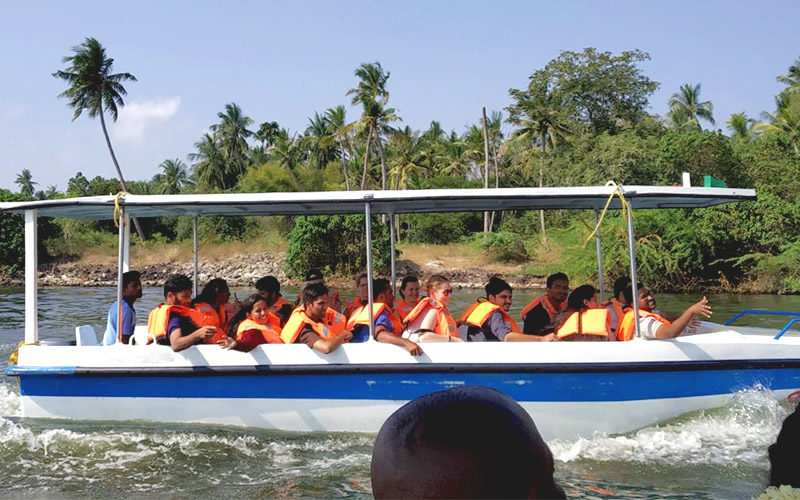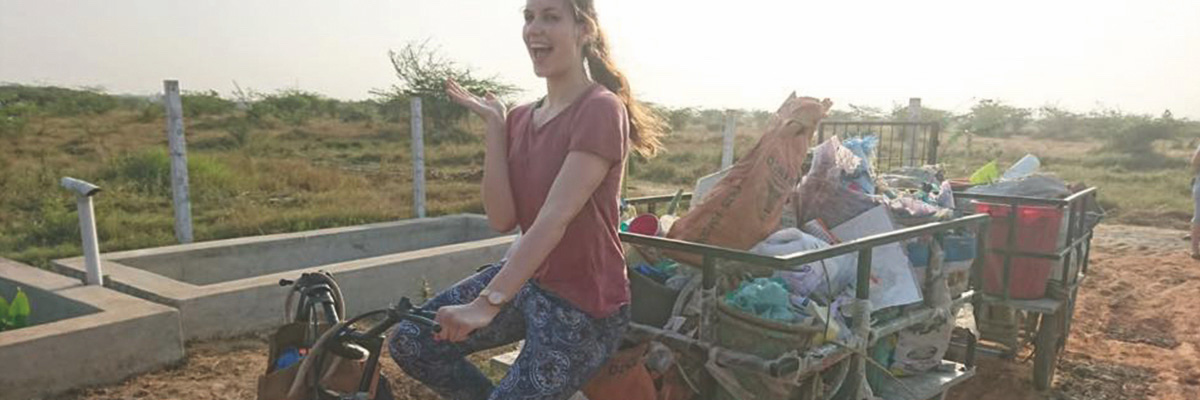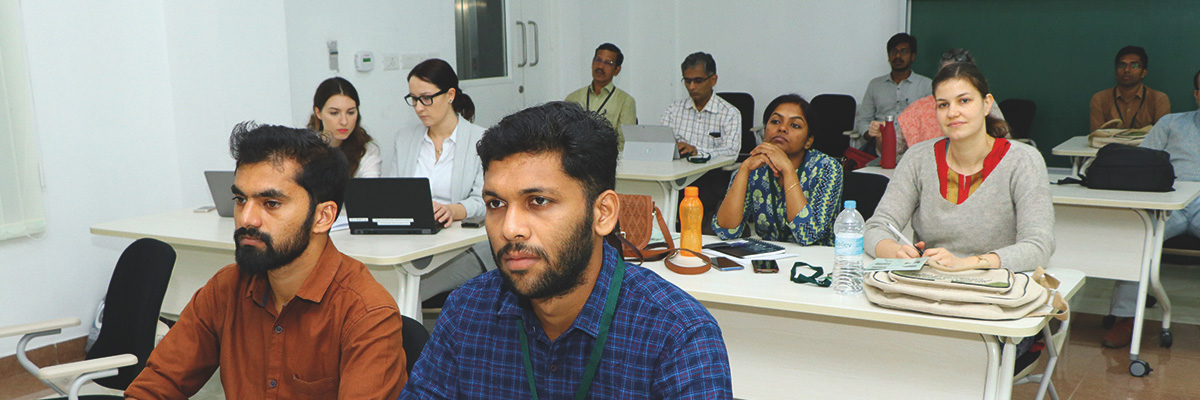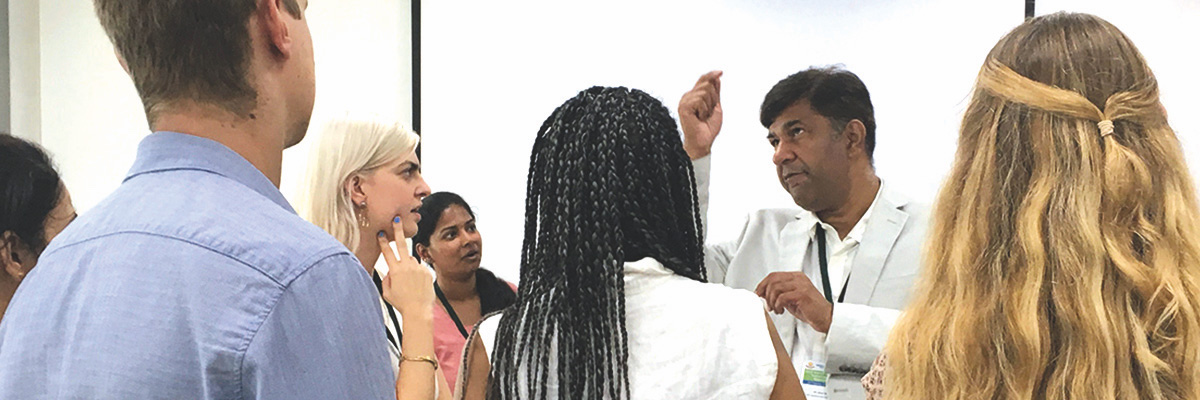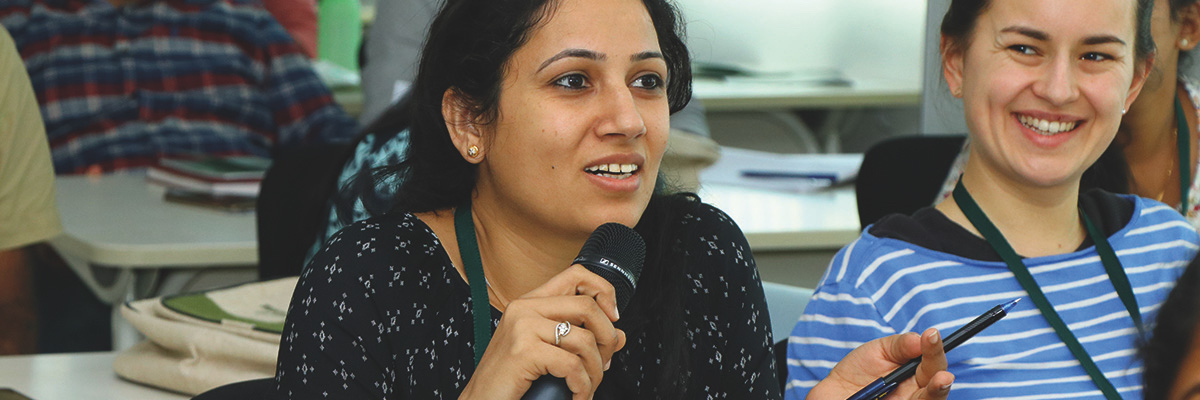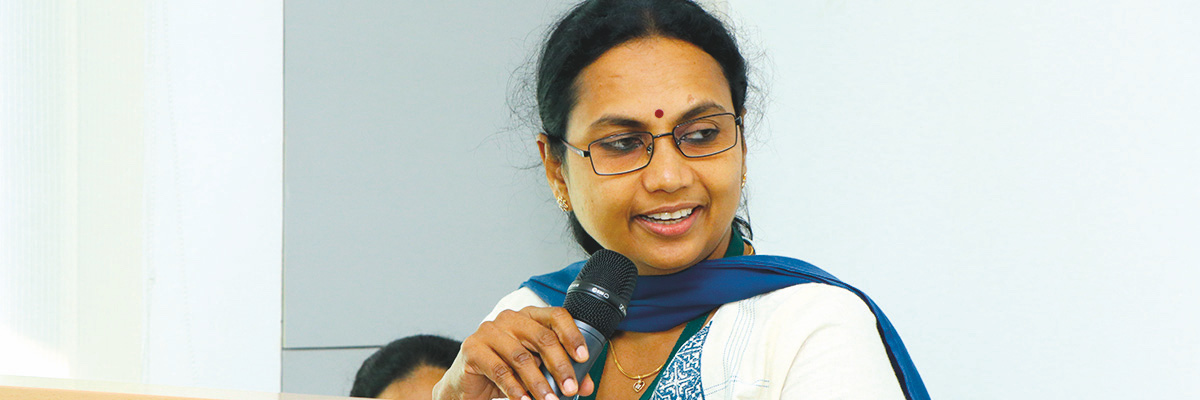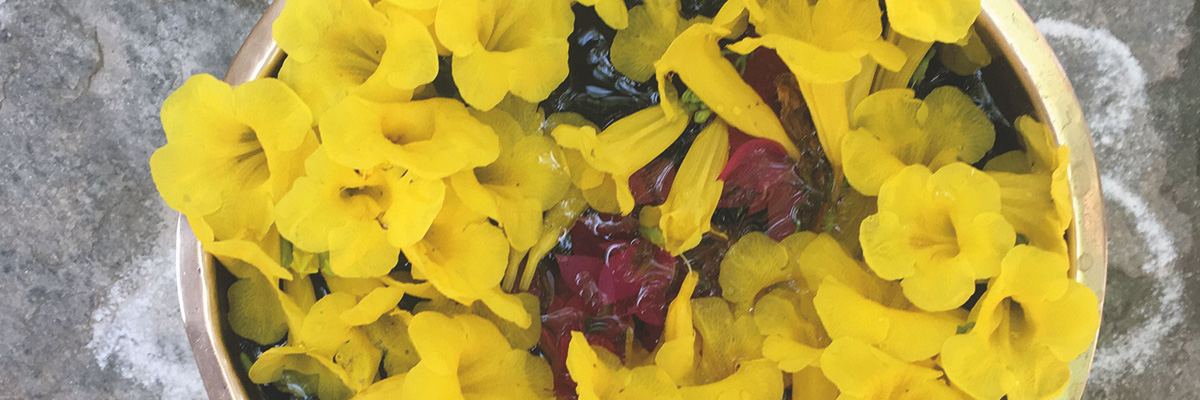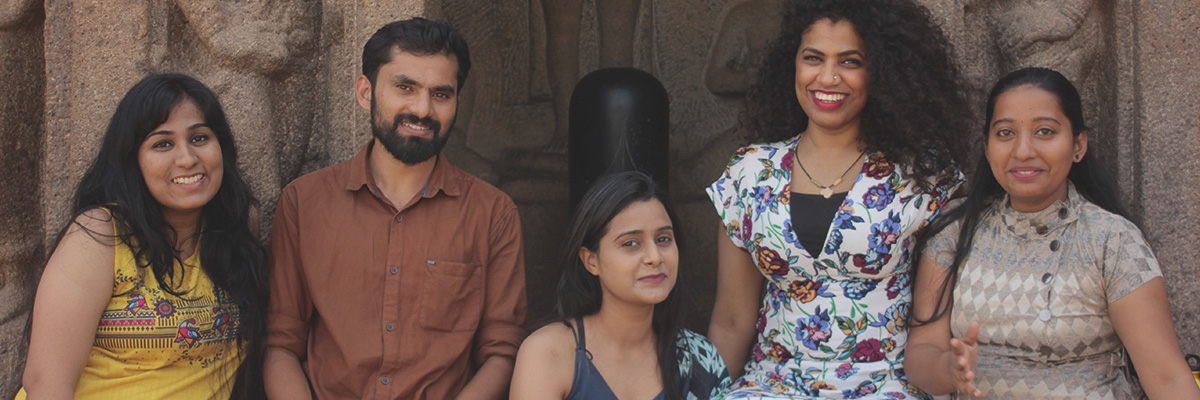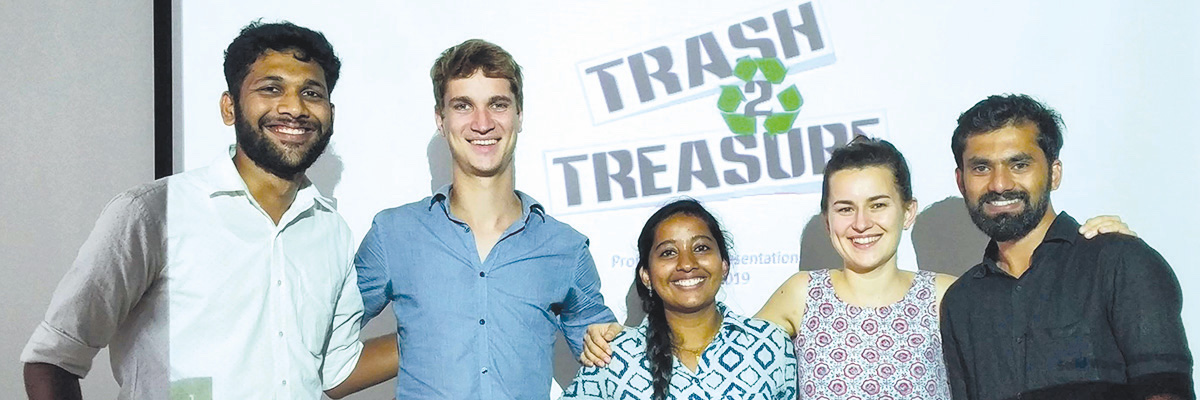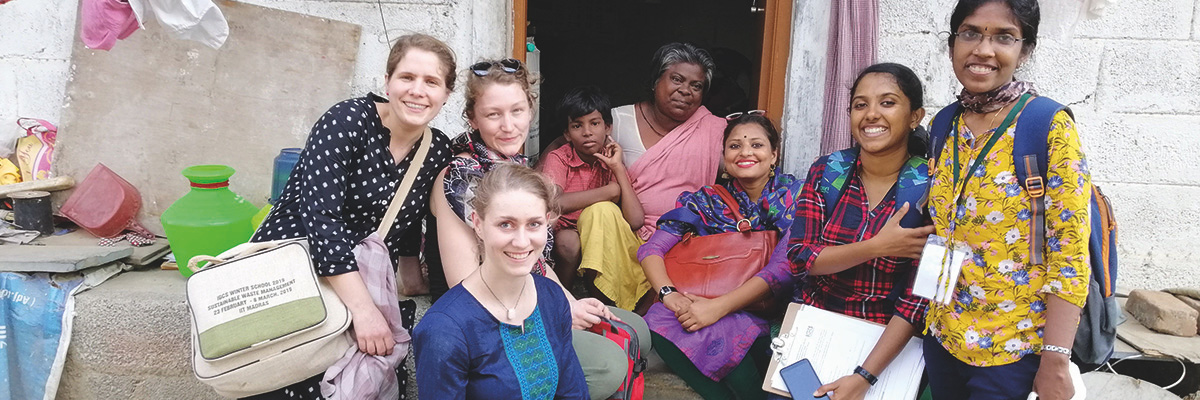Broadening horizons at the 2019 IGCS Winter School
Hannah was one of the 30 students who was selected to participate in the IGCS Winter School 2019 in Chennai. With this report she gives an insight into the school’s topics and activities as well as a few personal impressions:
I had the great opportunity to participate in the IGCS Winter School Sustainable Waste Management: Municipal Solid Waste and E-waste. The Winter School took place on the IIT Madras campus, a fantastic green space in the heart of Chennai, where we lived and worked for two weeks. Half of the participants were Indian students and the other half was from German Universities. We had various educational backgrounds: besides students from environmental sciences, there were also social and economic sciences, mechanical as well as electrical engineers and other fields represented. This excellent constellation allowed us participants the chance to an intercultural exchange and professional development.
High degree of interaction during lectures and group work
IGCS Winter School gave me an extraordinary possibility to explore new aspects of the waste management system and to overthink a lot our treatment with resources. The classes were divided into two parts: there were a total of 17 lectures which covered various aspects of solid waste management and e-waste in Chennai, India, Germany and from a global point of view. I find waste management systems so relevant that I am thinking about doing my master thesis in that area and within IGCS.
I personally enjoyed the discussions about social aspects of waste management the most. The topic of the lecture was Sociology and Waste Management by Dr. S. Chella Rajan. For me, it is one of the most relevant parts, when we speak about sustainability and – in our case – waste treatment and circular economy. We learned a lot with and from each other in the discussions after lectures and even during lunch breaks. We all felt the high relevance of the topic and the necessity to speak about the different topics and aspects of solid waste management such as social, technological aspects as well as organisation of the waste management system from the governmental side. Some of the lectures were especially enlightening and facilitating a lively discussion way past the lectures. Another very interesting class was given by Prof. K. Kuchta about Recycling of E-waste.
The second part was project work. We expressed our research interests and were divided into six groups accordingly. I personally enjoyed a lot to have several days reserved for our project work. We were able to dive deep into the topic, understand it, work on it and try to identify problems as well as recommendations. Our three supervisors from IIT Madras supervised us and helped us grow together as one team.
I was in a group to analyse the Coastal Solid Waste Management system and to make suggestions for improvement. With support from our supervisors, we went into the city and conducted a survey in different zones of the city, like commercial and residential areas sorting the results after income groups. Furthermore, we compared the type of waste that is collected in the municipal waste bins and waste that we found along the beach. By doing the segregation we found out that the waste from middle compared to high income households is very different, e.g. regarding to the relative amount of e-waste that people produce. By comparing the completely different looking pie charts of the waste from the beach and the waste from the residential area we assumed that waste at the beach must have another origin. To give an example, the beach waste contained a high amount of footwear which we did not find in other types of waste.
The surveys as well as the waste segregation were great team events. While doing the research we had many opportunities to learn about each other’s cultural backgrounds and intercultural collaboration. I enjoyed a lot working with in this intercultural and interdisciplinarygroup and it enriched our group a lot that we had various professional backgrounds. One of the main problems of Chennai’s waste management system is the segregation. The majority of the interviewed people told us, that they are willing to segregate the waste, if there would be a proper municipal segregation system.
Beyond the classroom
All the organizers, supervisor and lectures showed a huge interest to make us see and understand the place and the country where they are living, their culture and the topic they are working on. Apart from teaching a roundtrip in Chennai and a two-day trip to Mahabalipuram and Pondicherry was organized. Both were great possibilities for the whole group to get to know each other and to get to know the beautiful south-eastern Indian countryside, cities, historical and cultural sights. Another rather unintentional cultural highlight was the traffic in Chennai and the surrounding area. During our field trips we were often stuck in traffic. It made me aware how enormous not only Chennai but also many other Indian cities are.
One evening, one of the participants organised a badminton tournament which was a lot of fun for all of us. Apart of that, we spend a lot of time in the Campus juice bar, walking around on the campus and tasting India’s culinary diversity which was one of my cultural highlights. The food was usually vegetarian which seems to be common standard in India or at least on the campus in Chennai. Relating to a topic about waste management it was very interesting to notice that difference in the type of food people consume between Germany and India.
Many of the participants from German universities used the opportunity of the Winter School to explore India after the program. India is a great place to learn how to surf at Tamil Nadus coast, to do hiking in the Himalaya, to do island-hopping on the Andaman-islands, to go further south to Sri Lanka, to see Taj Mahal, Kerala and/or Goa, to relax at one of India’s beautiful beaches and I am quite sure there are missing various things to do and to see on my list.
What I take home from IGCS
Because of the interdisciplinary group at the IGCS Winter School we considered the topic of solid waste management from different angles. As an engineer I realized once again, that technology is only one vehicle to implement a well-working system for solid waste management. There are also aspects to be considered such as living standards or the historical growth of a city. If we want to achieve change, we must bear these aspects in mind, too.
Culturally speaking, I enjoyed it very much to get to know the various personalities and cultural backgrounds of the participantse, to find out about the differences of people from different countries, to sing, to dance and to laugh during our field trips. In my opinion there were many brilliant people amongst the participants regarding their knowledge on waste management but also regarding their skill to help people coming out of their shell.
In conclusion, I would strongly recommend applying for a Winter- or Summer School of IGCS. Another option to join IGCS is by applying for a research stay and an associated scholarship. The Winter School helped me to focus on sustainable aspects for two weeks and learn new aspects. During the school I started to write down many inspiring thoughts on post-it notes. These notes I took back to Germany to contemplate them further at home. I have started this process and look forward to the results
I had the great opportunity to participate in the IGCS Winter School Sustainable Waste Management: Municipal Solid Waste and E-waste in Chennai India in February and March 2019. The Winter School took place on the IIT Madras campus, a fantastic green space in the heart of Chennai, where we lived and worked for two weeks. Half of the participants were Indian students and the other half was from German Universities. We had various educational backgrounds: besides students from environmental sciences, there were also social and economic sciences, mechanical as well as electrical engineers and other fields represented. This excellent constellation allowed us participants the chance to an intercultural exchange and professional development.

